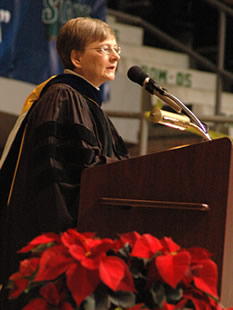
 Delta State University celebrated its 84th Commencement on campus Saturday, December 11, 2010, inside Walter Sillers Coliseum. Friends and family, along with Delta State faculty and staff, gathered to honor the accomplishments of 393 graduates.
Delta State University celebrated its 84th Commencement on campus Saturday, December 11, 2010, inside Walter Sillers Coliseum. Friends and family, along with Delta State faculty and staff, gathered to honor the accomplishments of 393 graduates.
On the day, one doctoral degree and 26 educational specialist degrees were conferred, while 137 master’s degrees and 229 bachelor’s degrees were awarded through the College of Arts and Sciences, the College of Business, the College of Education and the School of Nursing.
Delta State President, Dr. John M. Hilpert, opened the morning service.
“Each of today’s graduates has reached a milestone, and we are here to recognize their achievements,” said Hilpert. “On behalf of the faculty and staff, I extend congratulations to all graduates.”
As has been the long-standing practice, the winner of the S.E. Kossman Outstanding Faculty Award delivers the fall commencement keynote address. The 28th recipient of the honor, Dr. Susan Allen Ford, Professor of English and Writing Center Coordinator, addressed the graduating class by raising the questions “So what? What’s next?”
“We celebrate today as graduates, their families, and their communities have been celebrating for centuries,” said Ford. “But what, specifically, are we celebrating? What have you achieved? What does it mean? When the writers with whom I work reach the final paragraph of their essays, I like to ask, ‘So what?’ Why have you made us read these three or ten or twenty pages? What did you want us to get out of that experience? What should we do with it? So what?”
“Because we can get caught up in the dailiness of our lives, in checking things off on our to-do lists, we sometimes don’t stop and ask ourselves the right questions,” she said. “I tell my advisees. ‘Try to finish your general education requirements in your first two years.’ But how often do we stop and think about why these courses are required, much less what they add up to?
“Some requirements seem almost self-evident: we can certainly understand the utility of learning to communicate our ideas effectively in writing, and in speech,” said Ford. “Similarly, it’s not much of a stretch to realize why it might be important to know something about the history of our country, or of the world; to understand the physical world around us, or the living organisms that inhabit it, to know enough mathematics and economics to be able to participate in the discussions driving our state or nation. But why philosophy, or art, or music, or literature? Why languages? There are practical responses to these questions, but to my mind the real answer is more significant than mere practicality. It gets at what we’re here for.”
Expounding on the universal need for and the effects of education, Ford cited the works of feminist author Mary Wollestonecraft and poet Percy Bysshe Shelley.
“For Wollstonecraft, who authored the essay A Vindication of the Rights of Woman, education was about opportunity—not just the opportunity to make money, but the opportunity to become what we were meant to be,” said Ford.
“Shelley provides another motive for this experience of education, of awakening or enlarging the mind—an explanation that to me is so powerful and so true that within one minute of knowing I would be giving this commencement address I also knew that this description would be a part of it,” said Ford. “Why, we might ask, is it important that our minds be awakened and enlarged, that our imaginations be energized? Shelley answers:
The great secret of morals is Love, or a going out of our own nature, and an identification of ourselves with the beautiful which exists in thought, action, or person, not our own. A man [or woman], to be greatly good, must imagine intensely and comprehensively; he must put himself in the place of another and of many others; the pains and pleasures of his species must become his own. The great instrument of moral good is the imagination. . . .
That’s a powerful expression of what education does for us, and what’s central to it is the notion of diversity—a ‘going out of our own nature’ to share the perspective not merely of one other but of many others.”
Ford encouraged the graduates to reflect on their time at Delta State. “Think back to the moment you arrived,” she said. “Who were you then? Who are you now? What did you learn beyond the discipline you mastered as a part of your major? In other words, what has been the effect of this gift of education? Change can be difficult to measure, but asking the question ‘So what?’ is necessary to a strong conclusion, to making the experience worthwhile.”
In closing, Ford stated, “What is most important about the university is embedded in the very word—the universe of ways of thinking, and knowing, and imagining, and feeling, and acting that it has opened up to you. Return to this university when you can—for advanced degrees, for individual courses, but also for plays, for lectures, for exhibitions in the art museum and in the archives, for recitals and concerts. There is a world for learning and exploration and growth. But know that even more important than where in the world you are is the idea of the university that you take with you, within you, the questing mind that is the genesis of moral action and of a truly loving heart.”

